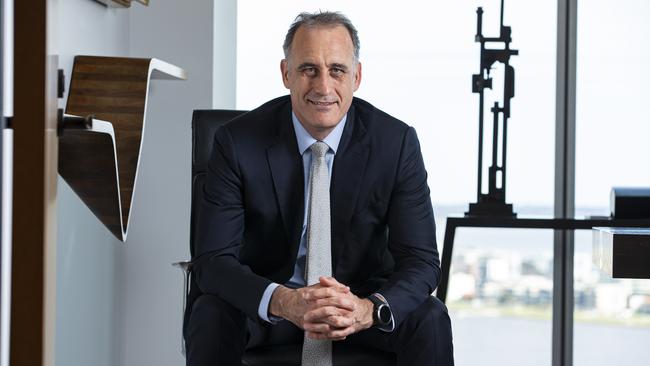Wesfarmers boss Rob Scott says the good times of cash handouts and low interest rates are gone
Wesfarmers chief Rob Scott expects productivity to go backwards and says proposed industrial relations reforms could threaten economic dynamism.
Wesfarmers boss Rob Scott says the pandemic cash handouts and low interest rate “honeymoon is very much over” and Australia faces productivity going backwards.
Mr Scott also said inflexible industrial relations reforms proposed by the federal government would threaten the national economic dynamism.
Mr Scott also suggested that domestic cost pressures, from energy and transport to the weakening Australian dollar, could force the Reserve Bank’s hand to keep on increasing the official interest rate.
Speaking after the Perth-based conglomerate’s strategy day on Tuesday, Mr Scott said he expected an array of economic challenges ahead and told The Australian that stalled productivity would lead to stagnant wages growth as businesses became unviable – and that proposed changes to industrial relations were happening at the worst time.
“I think they are real challenges to the economy, because unless we can get productivity moving we won’t see sustainable wage growth; and the consequence of wage growth without productivity is that businesses become unviable and then unable to employ people and invest,” Mr Scott said. “So it’s a very important dynamic to get right.”
This was being made worse by a range of industrial relations reforms now being explored by the federal government relating to possible new rules about the gig economy and contract workers which could shake up the labour hire sector.
“I am very concerned about the potential changes to industrial relations changes such as ‘same job, same pay’, removing the ability to use casual work, restrictions on the gig economy,”
Mr Scott said.
“All of these changes, if we are not careful, could remove a lot of flexibility in the workforce in the economy at a time when we really need flexibility.”
Mr Scott’s comments came after a five-hour presentation by Wesfarmers and its key divisional bosses, from Bunnings and Officeworks to Wesfarmers Health and its chemicals and fertilisers arms, that discussed the aspirations for each of the conglomerate’s key businesses into 2023 and beyond.
Starting the event, Mr Scott said there had been a switch to value by shoppers at the company’s retail businesses as the tailwinds of handouts, government spending and low interest rates that characterised the past few years and through the pandemic, came to an end.

“I would say that now the honeymoon is very much over,” Mr Scott said.
Referring to the past few years of Covid-19, Mr Scott said “it was also one of the only times in at least in the last few decades that I can recall where value wasn’t as important for households” as they enjoyed “very high levels of accumulated savings, very low-interest rates, and value was not as important”.
Mr Scott said consumers at the company’s retail chains, such as Bunnings, Kmart, Target, Officeworks and online marketplace Catch Group, were now seeking value and trading down – which should benefit the Wesfarmers retail portfolio.
“Customers are trading down categories, they are looking for value-oriented products; this benefits us and the core of what our businesses do,” he said.
“Cost of doing business pressure is coming back, domestic costs, costs increasing and I feel we are pretty well positioned to deal with that,” Mr Scott said.
But there continued to be a threat of wages rising too high too quickly, just at a time when productivity was going backwards.
“Wages are shining a light on productivity issues. The downturn in labour productivity coming out of Covid is quite a challenge for business; to push wages up at a high level when productivity is going backwards,” he said.
Mr Scott said there was a “real chance of more interest rate rises” mainly due to domestic cost pressures such as rents, energy and domestic transport, while the lower Australian dollar was boosting the costs of imports.
“So these domestic cost pressures could well put more pressure on the Reserve Bank to move interest rates,” he said.
Turning to the presentations from key Wesfarmers divisions, Bunnings boss Mike Schneider said the hardware giant was turning to a range of productivity measures such as recently using robots to check and fill shelves at Bunnings stores when closed at night.
He said Bunnings faced a fragmented and highly competitive market landscape and key demand drivers such as population, ageing housing, lifestyle trends and greater innovation and technology.
It would focus on outperforming the market by delivering the strongest customer offer through all phases of the cycle, on plans targeting growth across consumer and commercial segments and investment in new and expanded ranges such as pets.
Kmart and Target boss Ian Bailey said supply chains were being improved which was helping drive higher sales and lower markdowns to generate higher gross margins.
Its growing “Anko” homewares and general merchandise brand had recently expanded into other retailers, launching into Canada via local retailer Hudson Bay Company and was exploring opportunities in Europe.






To join the conversation, please log in. Don't have an account? Register
Join the conversation, you are commenting as Logout